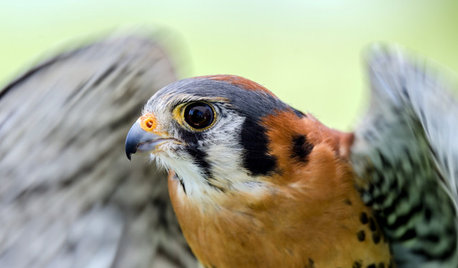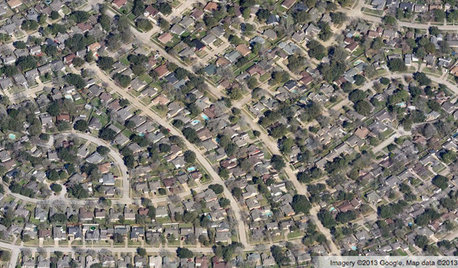Use of human urine?
I just read an article about a woman who saves her urine to use on her plants. I think she was China. What is the benefit of urine? Also, someone I know said that horse manure from the horse stall was good because it had urine in it.
Comments (136)
rosiew
12 years agoI haven'tfound it difficult. I use a sturdy plastic cup, holds about 16 oz, top opening is about 3 1/2". Keep that and a 2 qt. container under the sink. Try it and report back please, ladies.
SeraphArboris
12 years agoFor females collecting urine, a cleaned out pickle jar works perfectly. Glass jar with a wide mouth, manageable size, and watertight lid make it a winner.
Related Professionals
Danbury Landscape Architects & Landscape Designers · Fitchburg Landscape Architects & Landscape Designers · Fort Lee Landscape Architects & Landscape Designers · Brandon Landscape Contractors · Fair Lawn Landscape Contractors · Fort Atkinson Landscape Contractors · Gloucester Landscape Contractors · Melrose Park Landscape Contractors · Mercedes Landscape Contractors · West Chicago Landscape Contractors · Whitehall Landscape Contractors · Freehold Decks, Patios & Outdoor Enclosures · Glasgow Decks, Patios & Outdoor Enclosures · Riverside Decks, Patios & Outdoor Enclosures · Scotts Valley Decks, Patios & Outdoor Enclosureswertach zone 7-B SC
12 years agoI have two pecan trees that I planted at the same time, 4 years ago. One is close to my shop so it gets peed on regularly, the other one is 50' away so it doesn't get peed on regularly.
The one that is close to my shop is much bigger than the other one! Neither one has any nuts yet, so time will tell I guess!
PS, I have been trying to remember to go on the other one this summer and it seems to be growing better.
bstruss
12 years agoSo back to the OP, one thing I have wondered is whether the composting process will help lock in the n,p,k and other basic elements from the urine? I understand the principle of the nitrogen heating up the pile and breaking it down faster, but I wonder if somehow the microbes of the composting process will lock in these nutrients so they don't wash away but instead become later bioavailable to the plants - it would be great if they were maintained. Of course, we want to sodium to wash away!
rosiew
12 years agobstruss, you pose a very interesting question. The answer MIGHT be among some results I've found when Googling URINE IN AGRICULTURE. If it was maintained we'd have the best of the best, right.
I'm storing gallons of urine now to use when the leaves fall here. Have written UREA on all of them.
bstruss
12 years agoWell rosiew, I do worm composting and I know that this process locks nutrients into the soil, so I assume that regular composting probably does to a lesser degree because of the microbial action(?) Of course, worms cannot handle the ammonia and salt, but it would be my guess that many of these nutrients and elements may get locked via regular compostings. It would interesting to do a side-by-side compost analysis several months later on hot bins with and without urine added.
rosiew
12 years agobstruss, so, are you going to do a side by side? I sure would want to know the results. Guess I too could do one. I don't ever have large piles though - too hard for me to turn.
Anyone else want to add to our brilliant repartee? Jump on in.
Rosie
bstruss
12 years agoI am not really set up yet to do side by side testing, but may be soon. One thought that I have however, is that the real point of composting is to build humus and organic matter into the soil which then reduce nutrient requirements. Therefore, adding urine to the heap with the goal of adding nutrients might backfire just a bit, because high levels of nutrients (especially phosphorus) can be detrimental to the humus building goal. As such, it is probably safer to use diluted urine in the heap with the goal of maintaining a carbon-nitrogen balance, and nothing more. If I am mistaken about this, I am all ears.
BTW, I have posted a link to my blog page which has a reference to natural fertilizers - and which has a link at the bottom for the Woods End laboratory analysis of urine as a fertilizer.
Here is a link that might be useful: Natural Fertilizer and Plant Foods
Irishgal2
12 years agoIt may be a little off-subject, but I'm wondering if human urine in the compost or around the garden edge wouldn't also help deter the deer that think my garden is their smorgasboard!
LoboGothic
12 years agoAdding 1 gallon urine daily to 12' dia x 4' h compost pile, mostly dry leaves, coffee grounds layered with last year's compost. Salt free diet.
I'm concerned about too much of a good thing. How do we figure out when we should quit?
We've saved untold amounts of flush water. Collecting all coffee grounds from local Coffee Culture. Really enjoying this forum, great threads.
KatyaKatya
12 years agoLovely!
In case anybody still has a doubt: females can collect urine very efficiently. Was better when my kids were young and would pee in a plastic container for me (3 boys).
Diluted (diluted!) urine poured on soil, not directly on plants, works visible wonders. Did controlled experiments.gonebananas_gw
12 years agoThere are people including posters who are preoccupied with--perhaps I should say obsessed with--the subject of human urine as fertilizer. It is brought up ever again; I have seen it for years. The amount of nutrients is trivial. One is forced to entertain more-amusing notions concerning the transfixation on this practice and topic.
gardenlen
12 years agoi'm a banana bender from queensland australia,
no fixation with me it simply makes no sense whatsoever to flush it down the loo using good drinking water to do so.
len
Here is a link that might be useful: lens garden page
ralleia
12 years agoAbsolutely it makes good sense to make some use of it rather than flushing it down the drain with potable water. I think it's somewhat insane that we condition water to drinking water standards and then use to flush our toilets!
At least there are some waterless urinals out now.
I've also heard that down under in Australia, where water limitations are a lot more severe than in the U.S., men are encouraged to pee in the shower to save on flushes. I don't see why that should be just for men or just for Australians, so yes, I too pee in the shower. It's just efficient water use.
Heck, maybe I'll have to set up a female pee area outside this summer, too. As long as there's TP out there it'll sure beat trudging up from the lower gardens to relieve myself!
suburbangardenMD
12 years ago"The amount of nutrients is trivial. One is forced to entertain more-amusing notions concerning the transfixation on this practice and topic."
gonebananas...not sure if the "preoccupation" with urine as a synthetic fertilizer replacement is unwarranted. While I am sure there are those who enjoy the "gross factor" in Western culture, I think most see it for what it is, another toll for the garden. I linked to the most publicized study involving tomatoes. Its not that the urine/wood ash mix is the "best" or that its some wonder fertilizer, the importance is that it is readily available. After all...we all pee, some more than others but we do it, alot even!
I know its easy to get overly excited on these forums, I get worked up over new ideas here all the time, but in this case when a study is done that shows that a natural, readily available and free fertilizer source can be supplemented and produce equal results to "mineralized" fertilizers it should be worth taking note of. Sure, we may all not be comfortable peeing in the tomato patch, or mixing up a bucket of pee and ash in the back lot, but this is powerful information for third world nations, as well as gardeners on a budget. Gardeners like me really. While I can afford synthetic fertilizers, my love of gardening doesn't outweigh the cost benefit analysis done every year to determine how "profitable" the garden was this time around. The "green" side of the issue ( water conservation, organic fertilizer, etc. ) not withstanding, its a powerful tool for those on a budget or with no budget, just trying to survive.
Here is a link that might be useful: Urine/Wood Ash Study
robertz6
12 years agoThose folks squeamish at some of the older uses of urine -- Wiki says Romans used the product on their teeth.
terrene
12 years agoI am very interested in the possible useful and practical applications of urine in the garden and yard. It doesn't make sense that we are using so much potable water which is a finite precious resource to flush away another potentially useful resource (although it's nice to see many more low-flow toilets).
I have used pee on the garden compost piles and plan to try using it more as a fertilizer and critter repellent this coming season. This past summer I started collecting pee as part of my "stump rotting" experiment. I covered about a dozen stumps (avg 6-12 inch/15-30 cm diameter) with a pile of dense organic matter such as partially rotted grass clippings, hay, or the moss raked out from the lawn. Then, I pour pee or water on the piles to keep them constantly moist if it doesn't rain. The objective is to accelerate the rotting process and use as an organic alternative to hiring a stump grinder. We'll see!
As a woman I collect pee in a big plastic cup and pour in a re-used ice melter container, which is about 1 gallon sized and has a handle and "pour spout". I envy men, it is much easier to collect and apply for them! :)
ralleia
12 years agoA woman after my own heart!
I conduct stump-rotting experiments on my property, too. The grandest one is on an enormous linden tree stump, at least three feet in diameter and four feet tall with a center that had rotted out. We didn't want to put a chainsaw to it because someone had filled the wound with dirt and debris, apparently thinking that would protect the tree.
I scored and hacked at the remaining wood to create grooves, divots and more surface area, and then layered it with blood meal (for the nitrogen), sprinkled water on it, and then encircled the whole thing with mesh fencing and surrounded and covered the stump with torn up newspaper, leaves, grass clippings and food waste, plus handfuls of compost to try to seed the pile with bacteria. I watered the whole thing down as it was being built. The resulting compost pile is six feet tall and over six feet in diameter.
In another year and a half I might do an exploratory dig in there, but as you said, we'll see!
bi11me
12 years agoAs a commercial grower I feel it is likely in my best interest to remain silent about my own practices - suffice to say that I am in compliance with accepted organic standards - but here is a link that some of you may find useful:
Here is a link that might be useful: give pees a chance
Michael
12 years agoI haven't read all of the above posts so excuse, please if this is repetition. when referring to "salts" in an agronomic sense, what is meant is not sodium chloride (table salt) exclusively but many different possible "salts" like potassium, sodium, chloride, etc.. A problem can occur when the concentration of one or more salts accumulate in a soil, one of those is that plants can't pull water out of the soil, another is direct toxicity to plants while another is plant nutrient disorders.
As far as pee goes, living in my relatively arid environment it makes no sense to use pee in my soil as the sodium in pee is bad news for the soil. Sodium causes some clays to disperse and that can lead to less pore space in the soil and poor drainage. Read up on Sodic, Saline and Saline-sodic soils for lots more info. on what I'm getting at.
terrene
12 years agoRaeilla, we are going to have to bump this thread when we get results of our stump-rotting endeavors! :)
Gonebananas, no one is "forcing" you to entertain any notions about pee and gardening - just don't read the threads! The "ick" factor about urine is mostly psychological anyway. However, I do have some concerns about concentrations of salts or other waste products in the urine that could be detrimental.
The obvious benefit to being conservative about flushing and other uses of water is displayed in black and white on the water bill. Our bill shows how many gallons of water we use per day. During the most current 2 month period, our household used avg. 61 gallons per day. 61 gallons / 3 people equals about 20 gallons (approx. 75 liters) per person per day. During a hot dry summer, when I am watering the garden frequently, usage goes up to about 120-140 gallons per day.
bi11me
12 years agoThere are some valid concerns about salts, but even greater ones about other waste products in urine.
Here is a link that might be useful: It's everywhere
schizac
11 years agoI began collecting and fertilizing with urine this spring of 2012. I collect about 1 liter per day. I use about half of what I collect on my compost undiluted and it really does heat things up. The rest I've been diluting about 1:1. I have applied this to the root zone of many ornamentals, both in the ground and in containers outside. Everything is growing very well. The only possible negative result I have seen is on one Armeria maritima 'Rubrifolia'-the center of the plant died out in May but the resulting "ring" appears healthy now in August. This may or may not have resulted from urine fertilization.
I probably consume a lot more salt than I should, and this undoubtedly ends up in my urine, but I have not noticed any negative effects in any of my plants. I'm in the Seattle area, summers are always dry so I water my non-xerics frequently. Winters are wet, with nearly 40" of rain annually, which should be sufficient to leach away the salts. I haven't used any urine fertilizer on xerics such as Arctostaphylos, Ceanothus, Lavandula and the like. I don't feel that the extra nitrogen or water would be appreciated by those types.
Medications: I take Methylcobalamin (B12), L-Thyroxin and Cetirizine Hydochloride. I have no supporting data but I think (hope?) that these substances are substantially degraded through hot composting and cold composting for several months. I only use compost on my edibles, no direct application of urine fertilizer...so far.
Why do this? I feel we need to re-learn how to safely close the nutrient loop in our agriculture. We cant rely on fossils fuels for nitrogen and mining for phosphorus and other plant nutrients forever.
pnbrown
11 years ago"I feel we need to re-learn how to safely close the nutrient loop in our agriculture. We cant rely on fossils fuels for nitrogen and mining for phosphorus and other plant nutrients forever."
I think that is stating the case even less urgently than necessary. Not only can we not rely on it forever, but I think we can't rely on it for many more decades.
schizac
11 years agoThe situation is indeed urgent. The "luxury" of burning ten calories of fossil energy to produce one calorie of food energy will not be possible for much longer.
gardenlen
11 years agoso what do you want? for farmers to be in our neighbourhoods, using horse and plough or small enough market garden to use chip hoe and pick?
we all live so far away from farms that need machinery that we could find it hard to get a feed of fresh F&V.
don't know who deemed "the situation" as urgent, the science pushing this is pure speculation and theory with no hard evidence, maybe you can point to what we should look for?
i hear a lot of knee jerk calls, they want to shut down coal fired power, cars, trucks and oil production, but they don't want to shut down coal mining, and also what alternatives have they that are ready to go? none! of course.
just in case renewables can't supply power on demand and it is the most expensive. saw a news topic here, they were patting themselves on the back installed this whopper and expensive solar unit for a community, a bit of honesty came out they said in about 25 years it would have to be upgrade replaced, the obsolescence part never gets mentioned does it?
we recycle all that rots into our gardens, not much else we can do.
len
pnbrown
11 years agoWe are talking about the energy used in the Haber process to produce N, Len, as well as industrial-scale mining for K and P sources, and meanwhile billions of humans are flushing ample amounts of all three into the surface and ground waters where they do harm rather than good.
Please stay on topic or start a different thread, no need to hijack one that has been going for years.
Sirplus
11 years agoMy daughter goes through many diapers weekly.....they are most times quickly wrapped up and put in the garbage...can the urine soaked ones be in any way used in a way beneficial to my garden...I have read the above threads so I am wondering?
gardenlen
11 years agoi am on topic!
there is no way you can even suggest how to close the nutrient loop, our farms are too far away, so what could be recycled comes from farm direct almost to sewerage and trash collection.
apart from a few stalwarts like me and mine who recycle all rottable even urine and composted poo waste the maximum majority of the rest of our communities could care less and are situations of high rise tenements etc.,. that there is no possibilities.
and if there was a way that the local gov' could do something it would push up the price of rates, and then how does it get back to the farm when it came from?
then with our plastic wealthy yuppy set there is this monstrous "YUK" factor. instead of composting toilets being the norm' they are the rarity.
sorry to say one of the worst things for the environment is those disposable nappies, bring back washable clothe ones.
len
pnbrown
11 years agoNo, Len, talking about cars and pv systems or whatever, not to mention intruding your religious beliefs viz-a-vix global warming is not on topic.
The topic is using human urine as replacement for synthesized fertilizer. Apparently you support that idea, since you use your urine as fertilizer, so why trot out the off-topic stuff?
We can have another thread about whether or not God is responsible for global warming or whether he wants us to have solar panels.
rdak
11 years agoI can't remember if I have already responded to this old thread but I have always used my urine to feed plants.
Good stuff IMHO.
elisa_z5
11 years agoHi Sirplus,
sounds like your daughter is using disposable diapers, which normally contain gels and other synthetic ingredients which you probably don't want on your garden. Wait until your grand baby is old enough to pee directly in the garden, and then you'll be able to get the full benefits (and the fun!)Elisa
minniedamulcher
10 years agoThis is a great thread and I'm so glad to see it continuing for so long.
My mother used her "secret ingredient" in the 50s & 60s in New South Wales, Australia. We had an outside toilet so she saved her potty contents (urine with water added) and watered with it each morning.
I have used the Secret Ingredient to season my new straw bales and in the compost to add more nitrogen.
Now I'm building a hugelkultur bed and pouring on the stuff neat to compensate for the lack of nitrogen in the decay process. Like others, I appreciate saving flush water in the arid West, not having to buy N, and using a natural product available year-round.
I pour from my small collection tub (3lb margarine) into a Tide detergent bottle with that nice drip collection insert in the top. It's labelled Organic High-nitrogen Fertilizer.
Haven't tried aging any yet.
Thanks for all the wonderful comments & information.bear_with_me
10 years agoThis is a great discussion. I'm glad I happened on to it. The entire thread was interesting! Thank you to the participants!
I knew I wasn't the only one who recycled their urine into the garden. But I do feel self conscious about it. So I'm glad to see the others here.
Mostly I've used urine for trees and ornamentals. After reading a number of articles about urine to fertilize food crops, I've started saving it in a container and pour it on garden soil during my rounds around the yard. I have a 15 year old ginkgo tree, seed grown, that's around 20 feet tall, in an area that my 2 dogs use daily. That tree's sibling about 50 feet away is only about 10 feet tall. The only difference I know is the dog urine. Probably higher nitrogen than mine. It kills patches of grass but the tree is very healthy.
I have 10 raised beds, going on 12. This time of year, more than half of the beds are fallow. Having been somewhat depleted of nutrients I want to regenerate them. So I am pouring some urine around on the surface of each raised bed. Maybe a quart or two per bed. The soil bacteria are slower in the cold, and some will leach by winter rains, but maybe it will give a boost to the Spring plants. Plus the beds have some straw mulch to break down. The urine might help that.
For next year's garden it will be easy to urinate into a watering can and fill with water, to sort of fertigate the plants. I have read various dilutions - 1:5 or 1:10 or 1:20. I will also add a dusting of wood ash this winter. I read wood ash will provide potassium and phosphorus to balance the mostly nitrogen contribution from the urine.
Thanks again to the participants in this discussion. Very Useful.
pnbrown
10 years agoYou don't need to obsess over the dilution. After a heavy rain during the growing season I will sometimes pour on urine undiluted around heavy feeders. They will handle it no problem.
During the cold season releasing urine is largely a waste, even in a compost pile. best to store in air-tight containers.
bear_with_me
10 years agoPnbrown,
Thanks for the info!
Let's see.... a quart or so a day = 1 gallon in 4 days give or take. Maybe 100 days to Spring.... 25 gallons! I'm going to have to think about that!
I'm not going to obsess, like you say. Just good to see a discussion with some thought in it, and guidance as to how to do something that is still kind of unusual or not talked about, in a way that I hope is beneficial and not harmful.
A few of my new trees were pretty pale this year. I have 2 acres, and planted a lot of trees. I don't know the soil composition. Will send off a soil test. The soil test may not include nitrogen, the main contribution of the urine. Last year, I gave one of the trees a boost of fish emulsion, which did green it up a lot. Fish emulsion for every tree and shrub would be expensive. If I can do the same thing with urine, plus save water from fewer toilet flushes, maybe less pollution going into the ground water (septic system) or rivers (town system), then it's hard to think of a good reason NOT to recycle / make use of the urine.
slipperypencil
10 years agoWhy is it a waste during the cold season?
I spread 4 to 8 inches of leaves over my garden in the fall. I toss the urine on top of the leaves every day. Wouldn't the nitrogen help break down the leaves?
pnbrown
10 years agoI suspect that in dumping urine on leaves or whatever, during the cold season when plants are not metabolizing and microbes are not active enough to utilize the N and K, that the urea will off-gas long before it gets sequestered into the system, or the nutrients will get washed out by winter precipitation before it can get utilized.
In a pile large enough to be hot then it could be utilized by microbes, and later the dead microbes will be plant food. For example when one piles up urine-soaked straw it heats up, even in winter. Sadly nobody beds horses in straw anymore.
Orion60
10 years agoVery interesting thread. I had a soil test done and it shows that I have high amounts of P and K but it's low in nitrogen. A quick Google search for human urine NPK shows urine to have an average NPK of 11-1-2.5. That is close to exactly what I need! The salt content concerns me but I am on a low sodium diet anyway. I'll just dilute it down.
rgreen48
8 years agoI've been using urine for fertilizer for 20-some-odd years. When used properly it's a fantastic (not to mention - free) organic source of nutrients.
To use it 'properly', it's often beneficial to understand that horticulture mainly consists of conditioning soil in order to favor the growth of desired plants. As it seems most people here well understand, anything done to soil will affect its biotic environment and potentials.
Knowing the needs, 'likes', and habits of the desired plantings help the grower decide what, and when to make additions and changes to the soil.
Since urine is high in nitrogen, it can work well when used in soils where, and when, green growth is desired. Composted (aged) urine is usually lower in nitrogen than fresh, and can be beneficial for boosting levels of phosphorous in soils.
Since the bio-availability of nitrogen from fresh urine is very high, dilutions are usually an important consideration (the strength of which can be adjusted for frequency of use and, since urine is extremely water soluble, amount of rain or watering the soil receives.) Another corollary that is important to follow is: unless you are using a VERY high dilution ratio, never fertilize (that includes the use of urine) a dry soil.
Using fresh urine in vegetable gardens works best for plants in leafy-green growth stages. For tomatoes and many other fruiting plants, that means prior to the beginning of flowering and fruit set. While some fruiting plants (like zucchini) can handle later growth-stage additions of nitrogen in the form of urine, keep in mind that nutrient and ph balance can easilt be thrown off by the 'over-use' of many soil conditioners and fertilizers.
As most gardeners are aware, the nutrient needs and 'likes' of plants is usually measured in N-P-K percentages. Finding the right balance for any planting or bed depends upon having at least a general idea of what you have before you make additions, and the needs and tolerances of the plants being fertilized.
Adding too much nitrogen during (or even just before) the fruiting stage of flowering plants such as peppers (a plant well-adapted to sandy soils unable to hold and supply large amounts of available nitrogen) can encourage the green growth of leaves and biomass instead of the fruit the gardener desires.
While the buffering capacity of soils differ greatly, a soil test, and knowledge of your individual soil conditions, will help you to get a handle on what additions are 'safe' and appropriate for the planting. Too much nitrogen (in any form, and especially on a dry soil) can 'burn' most any garden plant. Most trees however, can easily handle and benefit from additions of fresh and/or aged urine.
Unless a plant is showing signs of nitrogen deficiency, I rarely add urine directly to the soil while the garden is in growth. I'll add it before, and shortly after transplanting, or in some cases seeding, but since young plants can be sensitive to levels of highly-available nutrients and salts, I do not usually put it right up against or 'on' the roots. The idea is to let the roots find it, or let the capillary action of soil moisture disperse it towards the plants. Instead, as i said, I use it on the beds before planting and depending on the crop, just after planting. Then, afterward - during growth - I use it on the 'weeds' (aka... the lawn.) I then collect, or mulch the lawn clippings depending on the needs at the time. Green manure is a good way to sequester and add slower-release nitrogen to soil or compost. Cover crops (especially those for over-winter use) can also use and sequester nitrogen (and thus fresh urine) for later crop availability.
Adding a balanced amount to a compost pile can (as many have already commented) also be an extremely beneficial use of urine.
Urine from animals differs greatly than that of humans and each species. Urine from cats and dogs can be much too acidic and concentrated for most garden use. Urine from farm animals such as horses and cows can be great additions to soil and compost (especially when gathered by collecting urine-soaked, high-carbon straw or saw dust from barns and sheds.)
In short, using urine properly can benefit most any environment. It is a natural part of the Earth's biology and life-cycle. Understanding its strengths and weaknesses can help a grower boost and maintain the healthy biology of any environment. Putting it to work around the house and property can divert what modern society considers a waste, and give the aware gardener another great organic supplement.minniedamulcher
8 years agoJerrybom: We are talking about various ways of using human urine for adding nitogen to our soil. If you'd like to do some reading about it, you'll find many responses to a Google search on the topic.
Most of us would not dream of adding nightsoil (feces), whether human or dog/cat, to our soil because of the harmful bacteria there. Believe it or not, urine itself is sterile when it comes from your body.pnbrown
8 years agoI put the nightsoil into garden areas, encapsulated in a lot of OM, and inoculated with manure worms, a few weeks or months ahead of planting.
rgreen48
8 years agolast modified: 8 years agojct... Yes, but try to dilute it or use it while the lawn is wet. Also, make sure you spread it around evenly. If used on just one small spot at a time you'll get 'patches' of darker green.
Ashley Phoenix
6 years agoGreat to see this thread on a house design website! Here in London,uk we've just had a freakishly dry winter, followed by freakishly hot march and midsummer but most Brits are still not water saving savvy. I've been peeing in a bucket and putting it directly on nitrogen lovers like leafy greens or the compost heap in summer and on woodchip compost paths in winter, rinsing bucket with water and chucking that on same spot by way of dilution for 20 years. Easy-peesy (sorry!) and garden like a jungle despite its cold, shady aspect. No sign of sodium problems, despite eating a fair amount of salt in my diet.


















shazam_z3